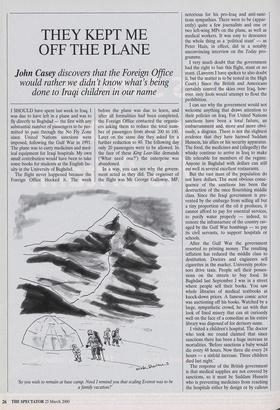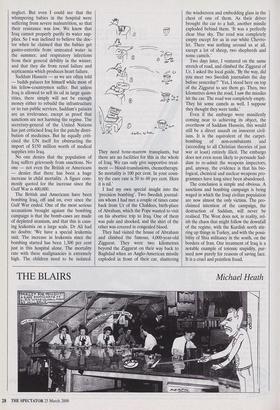THEY KEPT ME OFF THE PLANE
John Casey discovers that the Foreign Office
would rather we didn't know what's being done to Iraqi children in our name
I SHOULD have spent last week in Iraq. I was due to have left in a plane and was to fly directly to Baghdad — the first with any substantial number of passengers to be per- mitted to pass through the No Fly Zone since United Nations sanctions were imposed, following the Gulf War in 1991. The plane was to carry medicines and med- ical equipment for Iraqi hospitals. My own small contribution would have been to take some books for students at the English fac- ulty in the University of Baghdad.
The flight never happened because the Foreign Office blocked it. The week before the plane was due to leave, and after all formalities had been completed, the Foreign Office contacted the organis- ers asking them to reduce the total num- ber of passengers from about 200 to 100. Later on the same day they asked for a further reduction to 40. The following day only 20 passengers were to be allowed. In the face of these King Lear-like demands ('What need one?') the enterprise was abandoned.
In a way, you can see why the govern- ment acted as they did. The organiser of the flight was Mr George Galloway, MP, 'So you wish to remain at base camp. Need I remind you that scaling Everest was to be a family vacation?' notorious for his pro-Iraq and anti-sanc- tions sympathies. There were to be (appar- ently) quite a few journalists and one or two left-wing MPs on the plane, as well as medical workers. It was easy to denounce the whole thing as a 'political stunt' — as Peter Hain, in effect, did in a notably unconvincing interview on the Today pro- gramme.
I very much doubt that the government had the right to ban this flight, stunt or no stunt. (Lawyers I have spoken to also doubt it, but the matter is to be tested in the High Court.) Since the British and Americans certainly control the skies over Iraq, how- ever, only fools would attempt to flout the prohibition.
I can see why the government would not welcome anything that draws attention to their policies on Iraq. For United Nations sanctions have been a total failure, an embarrassment and, more and more obvi- ously, a disgrace. There is not the slightest evidence that they have harmed Saddam Hussein, his allies or his security apparatus. The food, the medicines and (allegedly) the whisky continue to arrive in Iraq to make life tolerable for members of the regime. Anyone in Baghdad with dollars can still eat well in several excellent restaurants.
But the vast mass of the population do not have dollars. The most obvious conse- quence of the sanctions has been the destruction of the once flourishing middle class. Since the Iraqi government is pre- vented by the embargo from selling all but a tiny proportion of the oil it produces, it cannot afford to pay for essential services, to purify water properly — indeed, to restore the infrastucture of the country rav- aged by the Gulf War bombings — to pay its civil servants, to support hospitals or schools.
After the Gulf War the government resorted to printing money. The resulting inflation has reduced the middle class to destitution. Doctors and engineers sell cigarettes in the market. University profes- sors drive taxis. People sell their posses- sions on the streets to buy food. In Baghdad last September I was in a street where people sell their books. You saw whole libraries of medical textbooks at knock-down prices. A famous comic actor was auctioning off his books. Watched by a large, sympathetic crowd, he sat with that look of fixed misery that can sit curiously well on the face of a comedian as his entire library was disposed of for derisory sums.
I visited a children's hospital. The doctor who took me round claimed that since sanctions there has been a huge increase in mortalities. 'Before sanctions a baby would die every 48 hours. Now three die every 24 hours — a sixfold increase. Three children died last night.'
The response of the British government is that medical supplies are not covered by sanctions, so it must be Saddam Hussein who is preventing medicines from reaching the hospitals either by design or by callous neglect. But even I could see that the whimpering babies in the hospital were suffering from severe malnutrition, so that their resistance was low. We know that Iraq cannot properly purify its water sup- plies. So I was inclined to believe the doc- tor when he claimed that the babies get gastro-enteritis from untreated water in the summer, and respiratory infections from their general debility in the winter; and that they die from renal failure and septicaemia which produces heart failure.
Saddam Hussein — as we are often told — builds palaces for himself while most of his fellow-countrymen suffer. But unless Iraq is allowed to sell its oil in large quan- tities, there simply will not be enough money either to rebuild the infrastructure or to run public services. Saddam's palaces are an irrelevance, except as proof that sanctions are not harming the regime. The secretary-general of the United Nations has just criticised Iraq for the patchy distri- bution of medicines. But he equally criti- cised the UN itself for obstructing the import of $150 million worth of medical supplies into Iraq.
No one denies that the population of Iraq suffers grievously from sanctions. No one — not even the British or Americans — denies that there has been a huge increase in child mortality. A figure com- monly quoted for the increase since the Gulf War is 400,000.
The British and Americans have been bombing Iraq, off and on, ever since the Gulf War ended. One of the most serious accusations brought against the bombing campaign is that the bomb-cases are made of depleted uranium, and that this is caus- ing leukemia on a large scale. Dr Ali had no doubts: 'We have a special leukemia unit. The increase in leukemia since the bombing started has been 1,300 per cent just in this hospital alone. The mortality rate with these malignancies is extremely high. The children need to be isolated. They need bone-marrow transplants, but there are no facilities for this in the whole of Iraq. We can only give supportive treat- ment — blood-transfusions, chemotherapy. So mortality is 100 per cent. In your coun- try the cure rate is 50 to 60 per cent. Here it is nil.'
I had my own special insight into the 'precision bombing'. Two Swedish journal- ists whom I had met a couple of times came back from Ur of the Chaldees, birth-place of Abraham, which the Pope wanted to visit on his abortive trip to Iraq. One of them was pale and shocked, and the shirt of the other was covered in congealed blood.
They had visited the house of Abraham and climbed the famous, 4,000-year-old Ziggurat. They were two kilometres beyond the Ziggurat on their way back to Baghdad when an Anglo-American missile exploded in front of their car, shattering the windscreen and embedding glass in the chest of one of them. As their driver brought the car to a halt, another missile exploded behind them. 'It was a perfectly clear blue sky. The road was completely empty except for us in our white Chevro- let. There was nothing around us at all, except a lot of sheep, two shepherds and some camels.'
Two days later, I ventured on the same stretch of road, and climbed the Ziggurat of Ur. I asked the local guide, 'By the way, did you meet two Swedish journalists the day before yesterday?"Yes, I stood here on top of the Ziggurat to see them go. Then, two kilometres down the road, I saw the missiles hit the car. The road was completely empty. They hit some camels as well. I suppose they thought they were tanks.'
Even if the embargo were manifestly coming near to achieving its object, the overthrow of Saddam Hussein, this would still be a direct assault on innocent civil- ians. It is the equivalent of the carpet- bombing of non-combatants and (according to all Christian theories of just war at least) entirely illicit. The embargo does not even seem likely to persuade Sad- dam to re-admit the weapons inspectors; and, anyway, the evidence is that his bio- logical, chemical and nuclear weapons pro- grammes have long since been abandoned.
The conclusion is simple and obvious. A sanctions and bombing campaign is being waged in which the Iraqi civilian population are now almost the only victims. The pro- claimed intention of the campaign, the destruction of Saddam, will never be realised. The West does not, in reality, rel- ish the chaos that might follow the downfall of the regime, with the Kurdish north stir- ring up things in Turkey, and with the possi- bility of Shia militancy in the south, on the borders of Iran. Our treatment of Iraq is a notable example of totemic stupidity, pur- sued now purely for reasons of saving face. It is a cruel and pointless fraud.



































































 Previous page
Previous page